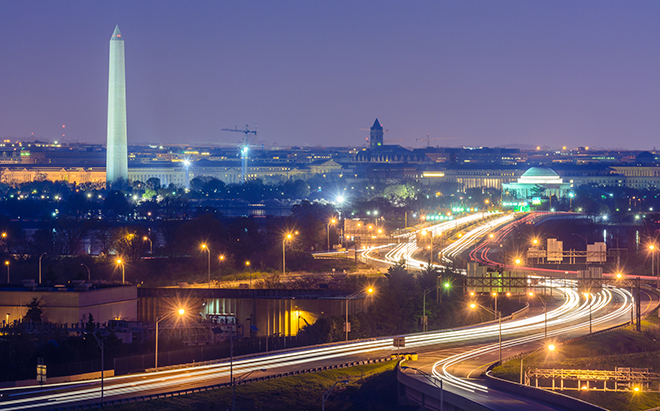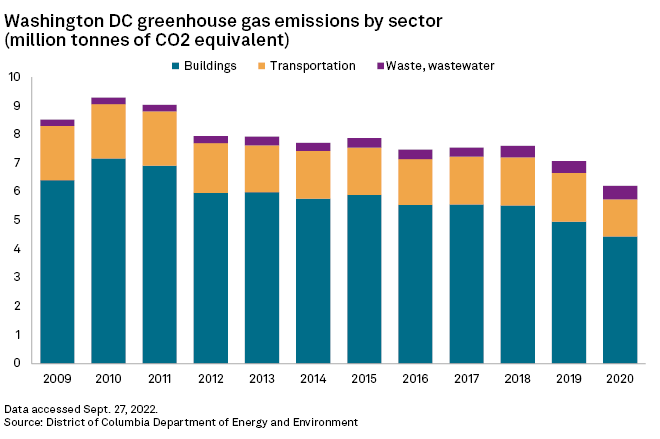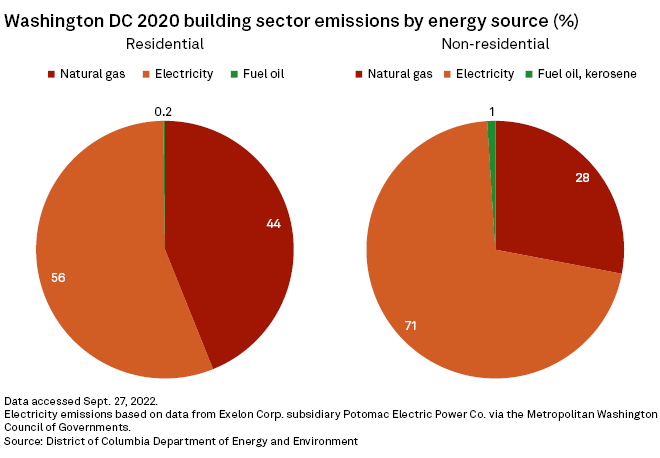
| The Washington, D.C., Construction Codes Coordinating Board approved an all-electric building mandate in the residential code but voted against a similar proposal for the commercial code update. Source: Mike Perry - flickr.com/mrperry/Moment via Getty Images |
A Washington, D.C., board that approves updates to the district's construction code dealt a setback to proponents of restricting natural gas use in new buildings.
On Oct. 20, the district's Construction Codes Coordinating Board voted 6-4 against adopting a proposal to require all-electric construction in most new buildings, one of several amendments that sought to align the periodic code update cycle with the city's climate goals.
Some board members said an 11th-hour email sent by Washington utility Potomac Electric Power Co., or Pepco, raised concerns about the electric grid's capacity to handle demand from all-electric buildings.
The board is likely to reconsider the proposal before sending code updates to the District of Columbia Council for approval. But the vote further delayed the contentious effort by Washington policymakers to join a national gas ban movement. The all-electric proposal would advance the city's goal of constructing all new buildings to a net-zero energy standard, a target that the District of Columbia Council codified into law in July.

The vote came after a technical advisory group hammered out several exemptions to address concerns by builders, restaurants and universities. It also followed a narrow 6-5 vote in May to approve an all-electric mandate for new single-family houses, townhomes and low-rise apartment buildings in the residential code.
Final proposal includes carveouts
The commercial code proposal has generated heated debate among board members and stakeholders, as industry representatives sought exemptions and district officials tried to limit carveouts.
The final proposal presented Oct. 20 exempted commercial cooking appliances to accommodate the Restaurant Association of Metropolitan Washington and address concerns from fire officials about their ability to provide meals during disasters.
It also included a carveout for laboratory equipment and would allow new buildings to connect to district heating systems, which often run on gas and are common on college campuses.
In a compromise with building developers and operators, code officials allowed gas use for decorative fireplaces and grills in community spaces within apartment complexes. It also exempted backup power systems and preserved exceptions for healthcare and detention facilities.
Questions over grid capacity
Among several points of contention, supporters and opponents have debated whether there is enough evidence that Pepco's electric grid can handle the increased load from building and vehicle electrification.
A 2021 report found that Washington's climate goals — expected to be achieved largely through electrification — would not produce electric distribution system growth beyond what Pepco has successfully managed and operated in the past. Heating electrification, in particular, will likely shift the distribution system from summer to winter peaking, leaving "room to grow" before new capacity is needed, according to the report prepared by the Brattle Group for Pepco and filed with the Public Service Commission of the District of Columbia. (1167)

Pepco stressed at the time that the report focused on systemwide impacts. The company anticipated that electrification would yield location-specific load growth that could require capacity enhancements in some parts of the city. Still, Pepco noted Brattle Group's finding that energy efficiency and demand response measures could moderate the need for grid investments and even reduce annual peak demand.
In September, Pepco said the accelerated timeline for electrification measures and the all-electric construction mandate proposed in the commercial code update affected the assumptions underlying the Brattle Group study. Pepco needs to analyze current gas load and the impact of shifting that load to the electric grid in order to "provide informed technical advice" and "avoid unintended adverse impacts," the company said in a Sept. 14 letter to the codes board.
Less than an hour before the board's Oct. 20 meeting, Pepco emailed the council to reiterate its position, decline to offer an amendment and express interest in participating in technical advisory group meetings. Collaboration would help the company incorporate the group's policy details into its analysis, which could in turn inform the implementation and timing of the all-electric construction mandate, Pepco Region President Donna Cooper wrote.
Frustration, concern over correspondence
Several board members who voted against the proposal said the email left them concerned about the grid's ability to handle growing electrification. Others expressed annoyance, saying Pepco's position remained vague even after board members engaged the company.
"I was frustrated to see their response coming this morning 40 minutes prior to the meeting, given that our meeting with them had been several weeks ago and there's been several attempts to follow up and request clarification on their position," said Casey Studhalter, a program analyst at the district's Department of Energy and Environment who coordinated amendments to the proposal.
Pepco expects to complete its analysis by year-end or early 2023, said Cooper, who joined the call after the vote. Among other things, the company will assess where construction is likely to occur and whether infrastructure enhancements are needed.
Pepco is a subsidiary of multi-utility Exelon Corp., which does not distribute gas in Washington but offers gas utility service through Delmarva Power & Light Co. in Delaware, Baltimore Gas and Electric Co. in Maryland and PECO Energy Co. in Pennsylvania. AltaGas Ltd. subsidiary Washington Gas Light Co. distributes gas in the district.
S&P Global Commodity Insights produces content for distribution on S&P Capital IQ Pro.



